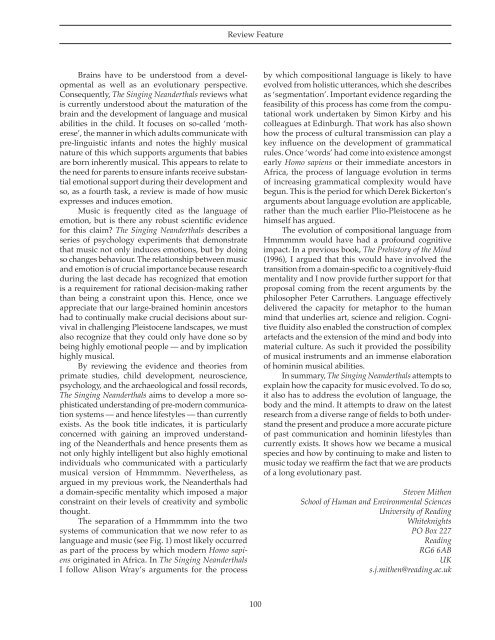The Singing Neanderthals: the Origins of Music, Language, Mind ...
The Singing Neanderthals: the Origins of Music, Language, Mind ...
The Singing Neanderthals: the Origins of Music, Language, Mind ...
You also want an ePaper? Increase the reach of your titles
YUMPU automatically turns print PDFs into web optimized ePapers that Google loves.
Brains have to be understood from a developmental<br />
as well as an evolutionary perspective.<br />
Consequently, <strong>The</strong> <strong>Singing</strong> <strong>Neanderthals</strong> reviews what<br />
is currently understood about <strong>the</strong> maturation <strong>of</strong> <strong>the</strong><br />
brain and <strong>the</strong> development <strong>of</strong> language and musical<br />
abilities in <strong>the</strong> child. It focuses on so-called ‘mo<strong>the</strong>rese’,<br />
<strong>the</strong> manner in which adults communicate with<br />
pre-linguistic infants and notes <strong>the</strong> highly musical<br />
nature <strong>of</strong> this which supports arguments that babies<br />
are born inherently musical. This appears to relate to<br />
<strong>the</strong> need for parents to ensure infants receive substantial<br />
emotional support during <strong>the</strong>ir development and<br />
so, as a fourth task, a review is made <strong>of</strong> how music<br />
expresses and induces emotion.<br />
<strong>Music</strong> is frequently cited as <strong>the</strong> language <strong>of</strong><br />
emotion, but is <strong>the</strong>re any robust scientific evidence<br />
for this claim? <strong>The</strong> <strong>Singing</strong> <strong>Neanderthals</strong> describes a<br />
series <strong>of</strong> psychology experiments that demonstrate<br />
that music not only induces emotions, but by doing<br />
so changes behaviour. <strong>The</strong> relationship between music<br />
and emotion is <strong>of</strong> crucial importance because research<br />
during <strong>the</strong> last decade has recognized that emotion<br />
is a requirement for rational decision-making ra<strong>the</strong>r<br />
than being a constraint upon this. Hence, once we<br />
appreciate that our large-brained hominin ancestors<br />
had to continually make crucial decisions about survival<br />
in challenging Pleistocene landscapes, we must<br />
also recognize that <strong>the</strong>y could only have done so by<br />
being highly emotional people — and by implication<br />
highly musical.<br />
By reviewing <strong>the</strong> evidence and <strong>the</strong>ories from<br />
primate studies, child development, neuroscience,<br />
psychology, and <strong>the</strong> archaeological and fossil records,<br />
<strong>The</strong> <strong>Singing</strong> <strong>Neanderthals</strong> aims to develop a more sophisticated<br />
understanding <strong>of</strong> pre-modern communication<br />
systems — and hence lifestyles — than currently<br />
exists. As <strong>the</strong> book title indicates, it is particularly<br />
concerned with gaining an improved understanding<br />
<strong>of</strong> <strong>the</strong> <strong>Neanderthals</strong> and hence presents <strong>the</strong>m as<br />
not only highly intelligent but also highly emotional<br />
individuals who communicated with a particularly<br />
musical version <strong>of</strong> Hmmmmm. Never<strong>the</strong>less, as<br />
argued in my previous work, <strong>the</strong> <strong>Neanderthals</strong> had<br />
a domain-specific mentality which imposed a major<br />
constraint on <strong>the</strong>ir levels <strong>of</strong> creativity and symbolic<br />
thought.<br />
<strong>The</strong> separation <strong>of</strong> a Hmmmmm into <strong>the</strong> two<br />
systems <strong>of</strong> communication that we now refer to as<br />
language and music (see Fig. 1) most likely occurred<br />
as part <strong>of</strong> <strong>the</strong> process by which modern Homo sapiens<br />
originated in Africa. In <strong>The</strong> <strong>Singing</strong> <strong>Neanderthals</strong><br />
I follow Alison Wray’s arguments for <strong>the</strong> process<br />
Review Feature<br />
100<br />
by which compositional language is likely to have<br />
evolved from holistic utterances, which she describes<br />
as ‘segmentation’. Important evidence regarding <strong>the</strong><br />
feasibility <strong>of</strong> this process has come from <strong>the</strong> computational<br />
work undertaken by Simon Kirby and his<br />
colleagues at Edinburgh. That work has also shown<br />
how <strong>the</strong> process <strong>of</strong> cultural transmission can play a<br />
key influence on <strong>the</strong> development <strong>of</strong> grammatical<br />
rules. Once ‘words’ had come into existence amongst<br />
early Homo sapiens or <strong>the</strong>ir immediate ancestors in<br />
Africa, <strong>the</strong> process <strong>of</strong> language evolution in terms<br />
<strong>of</strong> increasing grammatical complexity would have<br />
begun. This is <strong>the</strong> period for which Derek Bickerton’s<br />
arguments about language evolution are applicable,<br />
ra<strong>the</strong>r than <strong>the</strong> much earlier Plio-Pleistocene as he<br />
himself has argued.<br />
<strong>The</strong> evolution <strong>of</strong> compositional language from<br />
Hmmmmm would have had a pr<strong>of</strong>ound cognitive<br />
impact. In a previous book, <strong>The</strong> Prehistory <strong>of</strong> <strong>the</strong> <strong>Mind</strong><br />
(1996), I argued that this would have involved <strong>the</strong><br />
transition from a domain-specific to a cognitively-fluid<br />
mentality and I now provide fur<strong>the</strong>r support for that<br />
proposal coming from <strong>the</strong> recent arguments by <strong>the</strong><br />
philosopher Peter Carru<strong>the</strong>rs. <strong>Language</strong> effectively<br />
delivered <strong>the</strong> capacity for metaphor to <strong>the</strong> human<br />
mind that underlies art, science and religion. Cognitive<br />
fluidity also enabled <strong>the</strong> construction <strong>of</strong> complex<br />
artefacts and <strong>the</strong> extension <strong>of</strong> <strong>the</strong> mind and body into<br />
material culture. As such it provided <strong>the</strong> possibility<br />
<strong>of</strong> musical instruments and an immense elaboration<br />
<strong>of</strong> hominin musical abilities.<br />
In summary, <strong>The</strong> <strong>Singing</strong> <strong>Neanderthals</strong> attempts to<br />
explain how <strong>the</strong> capacity for music evolved. To do so,<br />
it also has to address <strong>the</strong> evolution <strong>of</strong> language, <strong>the</strong><br />
body and <strong>the</strong> mind. It attempts to draw on <strong>the</strong> latest<br />
research from a diverse range <strong>of</strong> fields to both understand<br />
<strong>the</strong> present and produce a more accurate picture<br />
<strong>of</strong> past communication and hominin lifestyles than<br />
currently exists. It shows how we became a musical<br />
species and how by continuing to make and listen to<br />
music today we reaffirm <strong>the</strong> fact that we are products<br />
<strong>of</strong> a long evolutionary past.<br />
Steven Mi<strong>the</strong>n<br />
School <strong>of</strong> Human and Environmental Sciences<br />
University <strong>of</strong> Reading<br />
Whiteknights<br />
PO Box 227<br />
Reading<br />
RG6 6AB<br />
UK<br />
s.j.mi<strong>the</strong>n@reading.ac.uk



